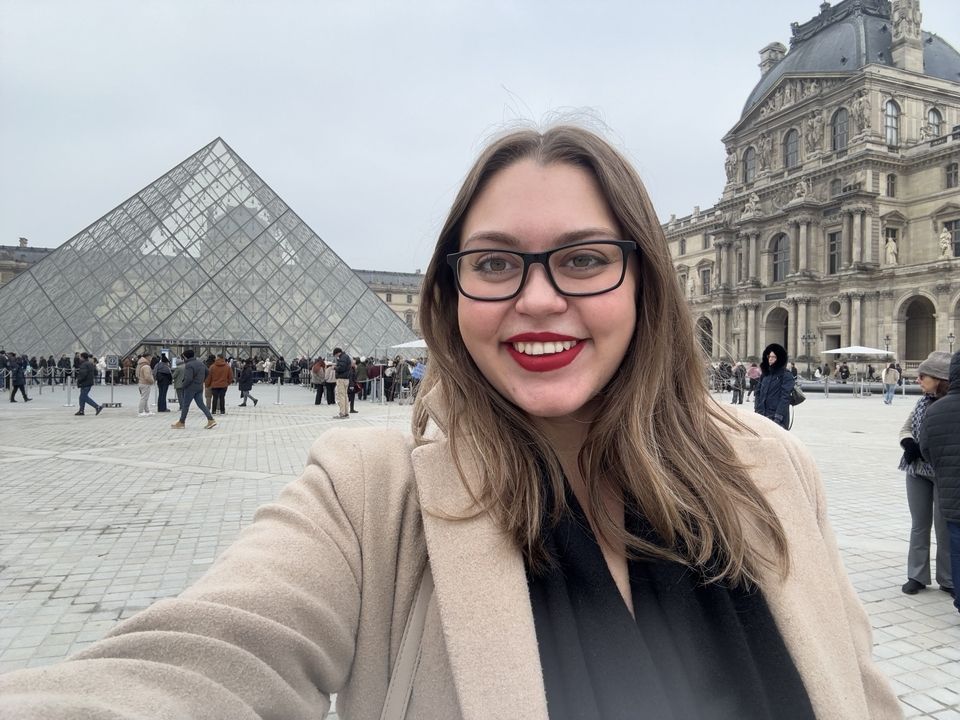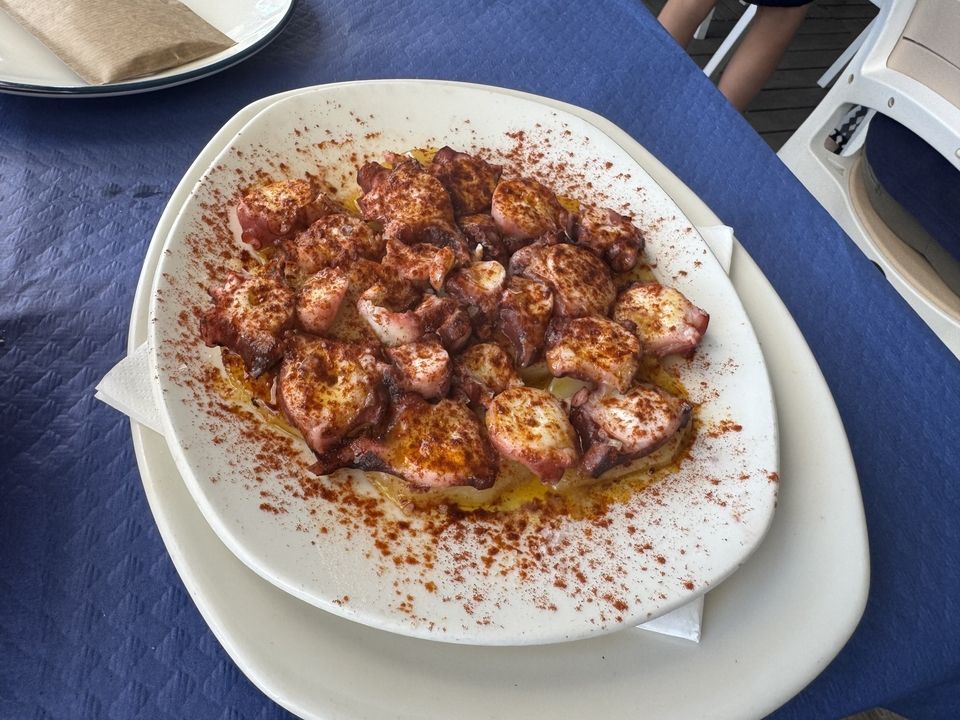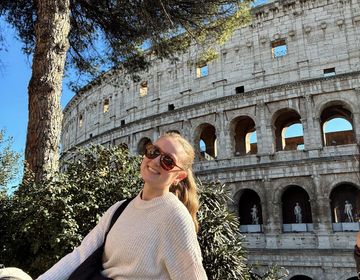Exploring Europe: Top Tips for a Weekend Getaway
During my time living abroad in Madrid, I visited 14 countries and 24 cities. (Check out this post for my recap of all the places I visited). So, I have learned quite a lot about how to have a successful travel experience, specifically for short weekend trips around Europe and solo travel. Here are some of my top travel tips that I learned along the way.
1. Strategic Booking
A seamless travel experience starts from the very beginning before you even leave for the trip.
Flights, Trains, and Busses
My first step when booking a trip was to check available flights (or trains/buses for closer destinations). I booked trips primarily based on when I could get a cheap flight and when departure times matched my travel schedule. I primarily traveled from Saturday to Monday, meaning I looked for very early Saturday morning flights and late afternoon/evening Monday flights. I mostly flew on Ryanair, but used Skyscanner to see if there were any cheaper options. This was also helpful for finding cheap flights on other airlines with better departure times for my travel schedule. For trains and buses between closer locations, I used Omio.
Hostels
Once I found the flights I wanted, I looked at hostels. I always booked flights and hostels at the same time to make sure the prices and availability worked for me. I have Hostelworld to find all of my hostels. Hostelworld can help you get an idea of the average price per night for the area. The most important thing I look at on Hostelworld is the reviews. I have paid slightly more for some hostels because the cheaper ones had concerning reviews, like gross bathrooms or bedbugs. However, you do have to keep in mind that it is still a hostel and may not exactly be luxurious. That said, this method helped me avoid having any horrible hostel experiences.
I generally check to see if booking directly with the hostel is cheaper or if there are any benefits for doing so. I would also advise checking beforehand how far your hostel is from the main sights of the city. In some cities, I have stayed closer to the city center because it wasn’t too expensive. In other cities (specifically Amsterdam), I actually stayed on the outskirts of the city or even in a completely different city close by and used public transportation to get where I wanted to go.
2. Packing
Number one rule of packing, especially for a weekend trip: bring only what you need. I only had a backpack for most of my trips unless I was traveling by train for a longer weekend. You can only fit so much in a backpack, especially if you want to avoid an oversized bag free, which Ryanair is notorious for. I thankfully avoided this somehow, but saw plenty of angry travelers at the departure gate.
With that in mind, I only brought the clothes I planned to wear that weekend. Check the weather before you leave and plan your outfits accordingly. During the colder months, I wore my coat on the plane or at least had it with me to save packing space. I also only had the pair of shoes I was wearing because shoes take up a lot of space (at least my US women’s size 11/Europe size 42 shoes do).
Other than clothes, I did usually bring travel-sized toiletries with me, though you can always buy toiletries once you get there if you need to. Keep in mind that you’re unlikely to find a U.S.-style supermarket and may have to track down a pharmacy to find what you need. I would suggest “roughing it” from your normal skincare and makeup routine to cut down on items you bring with you. Though, I have found European airport security to be a lot less strict with liquids (specifically makeup).
Other than clothes, here is the rest of my packing list:
Toiletries
Travel size shampoo, conditioner, body wash, face wash, lotion, deodorant, perfume (this is what goes in my clear Ziploc baggie that I have to take out at most security checkpoints)
Loofah
Face moisturizer
Toothbrush and toothpaste
Makeup
Hair ties
Hairbrush and comb
Makeup wipes
Nail clippers
Hostel Items
Towel (many hostels will make you pay to rent one)
Flip flops/Shower shoes
Lock (same as the towels)
Extras
Passport
Medicine
Phone charger and necessary adapters
Jewelry (nothing you’ll be sad about losing)
Headphones
Book
A bag/purse that isn’t easy for other people (pickpockets) to open while you’re carrying it
3. Sightseeing

My number one tip for creating an itinerary for your trip is to prioritize what you actually want to see, not what guides say you must see. If you don’t really like art museums, don’t waste your time and money doing something you won’t enjoy just because it’s one of the top sites in your destination. I generally make a list of the things I absolutely must see in each destination. Then, I book necessary tickets for museums or attractions. I suggest booking directly instead of third-party sites, as it is generally cheaper. I have other sights I can just stop by saved on Google Maps because for the rest of the time, I like to wander. Walking tours are also a great way to learn more about the history of the city and some of its most famous sites.
In terms of booking time slots for sightseeing, I have unfortunately found out the hard way that some museums and attractions are closed on Sundays and/or Mondays. If there is something you really want to see, check ahead of time to make sure it’s open during the time you want to see it. I would also check if any of the sights you want to see are known for being booked out way ahead of time. Sometimes I decided I wanted to visit a museum while I was right outside of it, and there were plenty of tickets left. Other times, I missed out on main attractions because I didn’t plan ahead (I’m looking at you Vienna Opera House, Sevilla Cathedral, and Last Supper Museum). Because I mainly traveled from Saturday to Monday, I tried to book my biggest must-see on Sundays so I had time for a good night’s sleep after a long travel day. Additionally, many European airports are far outside the city or in a completely different city, so you need to factor in travel time to and from airports if you want to book any sightseeing plans on travel days.
My other main tip for sightseeing is to plan for transit, rest, and meal times. You don’t want to go to a really cool museum and not enjoy it because you skipped breakfast and are hangry or because you ran there straight from another museum. I will also say that I am a big believer that experiencing the food and drink culture of a city is a huge part of the travel experience that shouldn’t be skimped on. For transit around cities, I walked almost everywhere, except in London and Paris because they are gigantic. I really only used the metro/buses if my hostel was far out from the city center. I believe walking is the best way to see a city and happen upon cool spots you might’ve missed otherwise.
4. Food

I won’t lie, I tended to splurge on food while traveling because it was one of the main things I wanted to experience about traveling. If that’s not in the budget for you, I would suggest booking hostels that have a kitchen so you can cook your own food.
Dining Out
For dining out at restaurants, it’s important to remember that the dining culture is likely different from what you’re used to. In my experience, waiters will generally leave you alone unless you flag them down. Additionally, everywhere I’ve been in Europe, the waiter will bring the card terminal to the table for you to pay. I did not have any issues with my credit card being accepted, though Discover and Amex may be more difficult to travel with in certain places. Unlike in the U.S., you do not have to sign the receipt after paying, so there is also no option to leave a tip afterwards. You either have to leave cash or tell them beforehand you pay to increase the price they charge your card to include a tip. However, you should check the local expectations for tipping before you pay. In some large cities, waitstaff may be more used to receiving tips from tourists, while other locals may see it as an unwanted influence on their own culture.
On that note, it is important to remember that you are a guest in other people’s space. You can see a lot of cool things while traveling, but you must remember that you are also visiting someone’s home. Be respectful of local customs and culture, and the locals themselves. Also, don’t assume everyone speaks English! Many people do, but it’s not a given. Even saying thank you in the local language can go a long way.
Finding Restaurants
For finding good, more authentic restaurants to eat at, I would suggest avoiding restaurants with pictures on the menu and near super touristy areas. Having pictures on the menu especially is known for being a sign that the restaurant caters to tourists. This doesn’t mean the food is necessarily bad, it may just not be as authentic of an experience. To find places to eat, I either just walk around until I see a menu outside of a restaurant with something that I want, or I use Google Maps to find restaurants near me (still to look at the menu beforehand). I would not suggest the walk around and walk in method for cities that are known for being expensive. I very specifically did not do this in Zurich and actually made dinner reservations ahead of time at restaurants that were more within my price range.
5. Safety
I solo traveled 15 out of my 21 trips, so safety was constantly on my mind. Though I am a 23 year old woman that is the height of the average U.S. male and like to walk around thinking I am invincible, clearly something bad can always happen. But despite my parents’ worst fears, I made it through all of my travels without being kidnapped or ending up in the hospital. So, here is some of my advice to stay safe while solo traveling, especially as a young woman.
First, always be skeptical of people. This can be hard while solo traveling because naturally you want to meet new people and strike up conversations. But if you get bad vibes, sometimes you just have to walk away and get yourself out of the situation. In general, I try to avoid talking to older men, especially if they approach me first. They may be very nice people, but it’s not in my best interest to wait around and find out that that’s not the case.
Most of the people I met and spent time with on my trips were people around my own age that I met at my hostel, always in a group and in public. Especially with people you’re sharing a hostel room with, even just saying hi can make the atmosphere less awkward and make you aware if there’s anyone you need to watch out for, though in many cases I found that most people kept to themselves. I actually found that I was more comfortable in rooms that I shared with more people than in smaller rooms, unless it was a female only room. I think having more people around made me less scared that I would end up alone with someone who had bad intentions. All of the hostels I stayed in had lockers to store your stuff, and I didn’t have any issues with my things getting stolen. Also, your stuff is replaceable. You aren’t.
Even if you do make friends at your hostel, you have to remember that you are still traveling alone and you shouldn’t rely on those people to take care of you if something goes wrong. They might, but you can’t be sure of that. This is why I only went clubbing once on a solo trip. If you don’t have someone you can call that can be there immediately if you need medical attention, it’s best to play it on the safe side. Did I desperately want to rent a Vespa to ride around Lake Como? Yes. Had I never driven a moped/motorcycle before, was outside of a major city, and had nobody to take care of me if I crashed? Also yes. The moral of the story is, play it on the safe side. You don’t have to restrict yourself or be rude to everyone you meet, but you do have to be aware.
6. Miscellaneous
And finally, a random assortment of other advice.
- Be aware of travel scams. The most common one I encountered was a man who would try to come up to you, tie a bracelet around your wrist, and make you pay for it. Loudly say no and just keep walking.
- Know what your phone plan covers for international travel. I had a Spanish phone plan that covered roaming in the EU. It did not, however, cover roaming in Morocco, which is how I ended up with an extra €60 charge on my phone bill for the month for just a few minutes of trying to use my phone at the airport. I then had to get a temporary Moroccan eSIM anyway.
- Keep at least a little cash on you, mostly small bills and coins, to pay for public toilets. Most of them are not free. It can also be helpful to pay for local buses, though some places are equipped to let you tap your card for the bus fare.
- If you do need to take out cash from an ATM, there will be fees, possibly from your home bank and almost certainly from the bank that owns the ATM. Decline the ATM’s conversion rate, as your home bank’s will almost certainly be better.
- Likewise, if you pay with a credit card and it asks whether you want the charge to be in the local currency or USD, choose the local currency. Your credit card company will have a better exchange rate. I would also suggest traveling with a card that has no foreign transaction fees.
- You REALLY don’t need to get to the airport that early, unless you’re checking in bags or have to go through passport control. Even then it’s usually still very quick. I generally arrive at the airport about an hour before boarding starts and get through security in about five minutes.
- Keep at least a picture of your passport on you, if not your actual passport. In some countries, police can legally stop you and ask you for your identification without giving you a reason. I also just personally didn’t feel comfortable leaving my passport at the hostel. This may be a controversial take because you risk getting pickpocketed. To that I say: 1. Don’t keep anything in your pockets, always in a zipped bag that is within your view and can’t be easily opened by other people, maybe even with a luggage lock on it. 2. Don’t pull it out and let anyone know you have it on you. 3. Be aware of your stuff and never leave it sitting anywhere. 4. Always check that you have everything important with you before you leave somewhere.
I hope all of these tips provide some insight into my travels and are helpful for anyone wanting similar experiences!
Related Posts

How to Plan a Weekend in Rome
After my weekend trip to Rome, I have compiled my tips for must-see sites, what to skip, where to shop, and what to eat!
Managing Mental Health While Teaching Abroad
Our expectations of Teaching Abroad can be far off from our reality, having an effect on our mental health, and that’s okay. Here are a few things I have found to be helpful in (gently) taking back control and creating a smoother transition into my new life as an English Teacher abroad in Spain.


